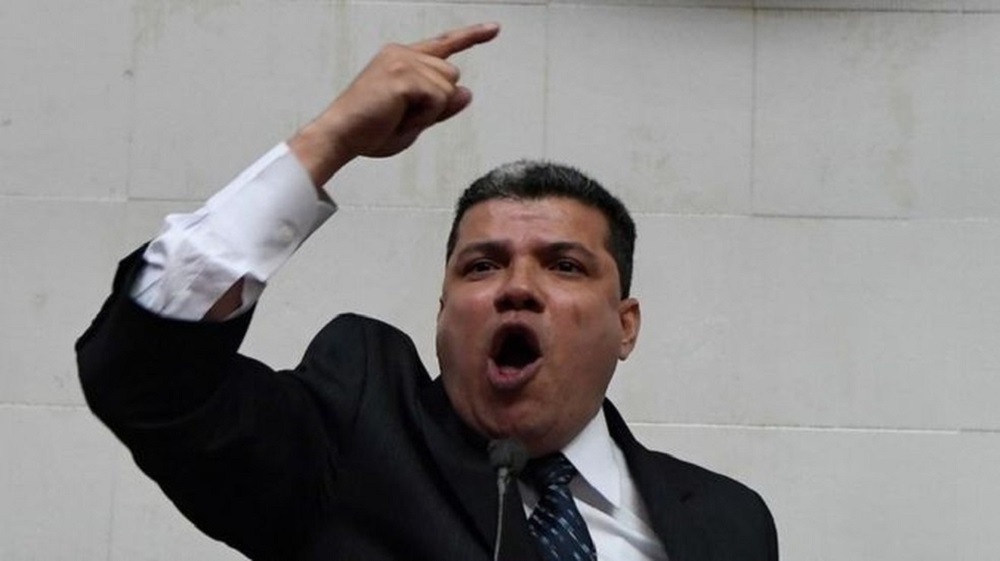RIO DE JANEIRO, BRAZIL – The European Union has reiterated its support for the Venezuelan opposition politician Juan Guaidó after the South American country’s Supreme Court ruled that the election of deputy Luis Parra as President of the National Assembly was lawful.
Venezuela’s Foreign Minister Jorge Arreaza falsely suggested last week that Guaidó had sought refuge in the French embassy in Caracas, which Paris denied on Friday, June 5th.
Furthermore, on Saturday, June 6th, Guaidó himself reappeared in the streets of Caracas, filmed wearing a mask and gloves as he walked through a line of cars waiting for fuel.

After Guaidó proclaimed himself “interim president” of Venezuela in January 2019, he was immediately recognized by the USA and about 50 other states. Guaidó argues that his office as president of Venezuela’s parliament empowered him to also take over the presidency. The opposition politician and his supporters base their claim on the unilateral non-recognition of Maduro’s election in May 2018.
The next election of the president of parliament was scheduled for the start of this year. Two controversial votes led to the election of Luis Parra, who also comes from the ranks of the opposition, and the confirmation of the former chairman, Guaidó, at the head of the anti-parliament. Unsurprisingly, the Supreme Court, which is little more than a rubber stamp for anything Maduro wishes, has now confirmed Parra’s election.
The EU assessed this tainted court ruling as a “further deepening” of the “long-lasting institutional and political crisis in Venezuela”. Parra’s election had been “illegitimate”. Therefore, the EU “continues to give its full support to Juan Guaidó as President of Venezuela’s Parliament”. However, Latin American governments and also the German Bundestag’s Academic Service described this endorsement as contrary to international law.
Brussels has now also criticized the Venezuelan Prosecutor General’s motion to the Supreme Court to ban Guaidó’s party, the Voluntad Popular (VP), as a terrorist organization. This was a “step in the wrong direction”. In April 2019, VP politicians were allegedly involved in an attempted coup. Recently, they were linked by Maduro to an attempted military coup by an international mercenary force.
In its statement, the EU stressed that a solution in Venezuela could only be achieved “through a genuine and inclusive political process leading to free and fair presidential elections”. With regard to military intervention, the declaration clearly states: “We reject any kind of violence, including any military or violent invasion of the country”.
Contrary to the call for a political process is the EU’s explicit support for the recent US plan for Venezuela, which includes the disqualification of President Maduro and other leaders of the ruling socialist party from future elections.
On Friday, the French news agency AFP, citing the Venezuelan Foreign Minister Arreaza, reported that Guaidó was in the French embassy in Caracas. Days earlier, President Nicolás Maduro had implied that his opponent was “hiding” in a diplomatic mission.
“We cannot invade and forcibly remove Guaidó from an embassy of any country, in this case, Spain or France,” Arreaza said in a radio interview about Guaidó’s alleged escape to the French embassy and about the stay of his comrade-in-arms Leopoldo López at the residence of the Spanish ambassador in Caracas. We hope that these governments will remedy the situation […] and hand the fugitives over to the Venezuelan justice system,” Arreaza added.
France forcefully denied that the Venezuelan opposition leader had fled to one of its diplomatic missions in Caracas. “Mr. Juan Guaidó is not at the French embassy in Caracas,” said Agnes von der Muhll, spokesperson for the French foreign ministry, “We have repeatedly reiterated this to the Venezuelan authorities. Guaidó is not in any French facility in the South American country”. Guaidó reappeared in public the following day.
The ongoing dispute over Guaidó’s self-proclaimed office also involves massive financial interests. Guaidó, like President Maduro’s government, claims to have billion-dollar gold reserves of the National Bank of Venezuela abroad.
In a legal dispute between the Central Bank of Venezuela (BCV) and the Bank of England (BoE) over the sale of Venezuelan gold reserves, the United Nations Development Programme recently agreed to manage proceeds from a potential sale in order to buy aid supplies to fight the Covid-19 pandemic in Venezuela. This is based on a memorandum of understanding between Venezuela and the UN authority.

This concerns gold blocked by Great Britain worth about US$1.3 billion. The dispute also concerns Deutsche Bank, which, after the confiscation of a gold deposit from Venezuela due to outstanding debts, is forced to repay the difference at current market value. The Deutsche Bank now wants to wait for the ruling expected in London to decide to which side the money will be paid.
The Maduro government was favored by Spain’s decision on Thursday to transfer frozen Venezuelan funds to the Pan-American Health Organization (PAHO), the W.H.O.’s local arm, to help mitigate the impact of the coronavirus pandemic in the South American country.
“We welcome the fact that the agreements between the Central Bank of Venezuela, the Bank of Spain, and the readiness of the PAHO, under the coordination of both foreign ministries, have contributed to the use of Venezuelan funds to fight Covid-19,” said Foreign Minister Arreaza.
Source: Amerika21

